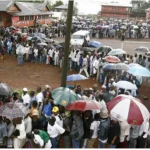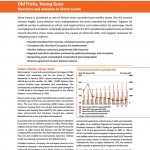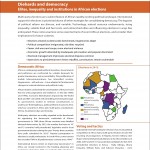This is the third of three blogs about Uganda’s 2011 elections written by a Ugandan journalist living in Kampala who has asked to remain anonymous.
In the run-up to Uganda’s second successive multiparty elections on 18 February 2011, Ugandans keenly followed the popular protests that have swept North Africa. Dr Kizza Besigye, the main challenger to President Yoweri Museveni, indicated that Ugandans would be prepared to follow their lead and take to the streets if he did not win. It appears that the majority of Ugandans side with Museveni who insisted that “there will be no Egypt-style revolution here”.
The outcome of the elections were as opinion polls predicted. President Museveni was re-elected for a fourth term, receiving 68.38% of the vote, up from 59% in 2006. Besigye took a disappointing 26.01%. In the new parliament, Museveni’s National Resistance Movement party continue to dominate, winning over 76% of constituencies. Voter turnout continued to decline.
Reactions to the election results revealed that Besigye was not prepared for such a resounding defeat. In the past three elections – in 1996, 2001 and 2006 – Museveni’s share of the vote declined, while support for opposition parties grew. Besigye was convinced support for Museveni would further fall, but he underestimated the tenacity of his opponent. Museveni racked up a higher percentage of votes than in 2006. The seven challengers for the presidency – Kizza Besigye, Norbert Mao, Olara Otunnu, Abed Bwanika, Beti Turwomwe Kamya, Jaberi Bidandi Ssali and Samuel Walter Lubega – played right into the president’s hands, dividing any coherent opposition to his reign.
Besigye described the elections as a “sham”, and insists Museveni’s re-elected government is illegitimate. While the conduct of the elections has been criticised, with Human Rights Watch claiming that political and human rights activists were detained, accusations of voter intimidation and violence are fewer than in previous ballots. Museveni reverted to the old trick of buying voters’ loyalty. Edward Scicluna, the European Union’s election observer mission chief, told the UK’s Financial Times:
“While in the past the way of influence was with the stick and violence, now we’re getting a lot of carrots: ‘You give me a vote, I give you a bowl of rice or a goat’ – goats and money were distributed … Definitely the ruling party has more resources and therefore a great imbalance, it uses scarce state resources as well.”
Museveni becomes East Africa’s longest-serving leader, overtaking Daniel arap Moi who ruled Kenya for 24 years. By 2016 – when Museveni completes fourth term – he will have been president for 30 years, joining an elite group of African leaders that include Angola’s Eduardo dos Santos, Cameroon’s Paul Biya, Zimbabwe’s Robert Mugabe, and Burkina Faso’s Blaise Campaore. A real U-turn for a man, who shortly after coming to power in 1986, insisted that heads of state who hold office for more than ten years have outstayed their welcome.
Popular revolt to Museveni’s rule is unlikely, for a number of reasons. Ethnic divisions remain strong in Uganda, and divide civil society. The opposition is reluctant to incite revolt for fear that Uganda will suffer the same fate as Kenya in the aftermath of the 2008 elections, when ethnic violence rocked large parts of the country. Nicholas Sengoba, an analyst, told Bloomberg News, “Many people are fearful of rising up in case the violence turns ethnic, and goes the Kenyan way. If you entice people and then lose control, you could still be held responsible and that may end up at the ICC.”
In Kampala – Uganda’s capital – offices, shops, schools and banks are open and running as normal. But the presence of security and military personnel in the city streets, alleys and suburbs is clear for all to see. Museveni warned that anyone one who uses “extra-constitutional means” to influence politics will be “locked up”. He appears to be staying true to his word.












